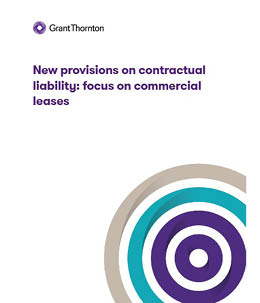Focus on commercial leases
The provisions of “Cura Italia” Decree (art.91, part 1)
Art. 91 of “Cura Italia” decree introduced an important provision on delays or contractual breaches due to the implementation of containment measures.
In particular, the Decree provides that the observance of containment measures due to the COVlD-19 emergency could be a cause for breach that is not attributable to the party; specifically, the observance of emergency measures can exclude: (i) the debtor’s liability due to breach under art. 1218 of the Italian Civil Code; (ii) the application of limitations of actions; (iii) the application of penalties due to delayed or omitted payment.
The Italian Civil Code regulates the liability of those debtors who do not correctly fulfil their obligations, imposing them to compensate for damages, unless the debtor proves that the breach or the delay derived from an impossibility due to causes that are not attributable to the debtor. In other words, if the impossibility to fulfil payment that does not depend on the debtor excludes the debtor’s liability.
However, though article 91 of “Cura Italia” decree favours the debtor in proving the impossibility to pay, it does not automatically exclude liability: in fact, the defaulting debtor must prove that containment measures have been observed and that this made it impossible, either totally or partially, to fulfil the payment, or to fulfil it late. The actual exclusion of contractual liability must be evaluated case by case – assessing if payment is actually impossible in each specific case - and duly justified by the court seized by counterparty.
The provision, though it is directly addressed to the court that will have to decide on the dispute, has an effect also on the non-defaulting counterparty: in fact, the creditor, who is aware that, in the current circumstances and meeting the relevant requirements, the claim for fulfilment of the debtor’s obligation can be rejected in court, should be incentivized to reach a compromise with the debtor.
Practical application to commercial leases
As concerns lease contracts, it seems that lessees cannot claim the impossibility to fulfil payment (either totally or partially) of lease rentals related to premises (shops, offices, businesses) that cannot currently be used due to the current containment measures.
This is based on three considerations:
- The concept of “impossibility” that relieves the debtor from any liability is generally meant as a rigorous material impossibility to comply with the expected fulfilment. With regard to monetary obligations – that is the main obligation of the lessee, who has to pay the agreed rental - this kind of “impossibility” could never apply, since money is defined as a fungible and always available good: the provision of money is never materially impossible;
- Moreover, the lessor’s obligation – consisting in delivering the located good to the lessee in good conditions, maintaining it in such good conditions for the entire term of contract and in granting its pacific use – is not impossible, nor defaulted: leased property remains to the lessee, also in the activities suspension period;
- The suspension of activities should have, for now, a very limited time scope compared to the typical term of a commercial agreement, so it should not nullify the economic and substantial reason underlying the whole contract (moreover, leased property could have an additional function to the commercial or production one, being also used as warehouse, office, headquarter).
While insufficient financial resources, due to missed revenues, do not exempt the lessee from paying claiming the “impossibility” to fulfil their obligation, the lessee could however terminate the contract due to excessive onerousness – as long as deemed applicable to long-term contracts even if the excessive onerousness is temporary – that allows the concerned party to terminate the contract when the obligation (in this case, the payment of rentals) is too onerous due to extraordinary and unforeseeable events. This solution is clearly interesting for those who intend to close their activity in the leased property definitely.
In any case, the lessor has the right to avoid the termination of contract by proposing to properly reduce the amount of the rent. However, even the above last possibility seems to be reserved only to business activities carried out in leased property falling within the C/1 cadastral categories (shops and workshops), considering that art.65 of “Cura Italia” decree admits, for 2020, a tax credit equal to 60% of the lease rental relevant to March (which will probably extended also to April).
This provision, in fact, mitigates the damage caused to lessees due to the temporary closure of commercial premises.

